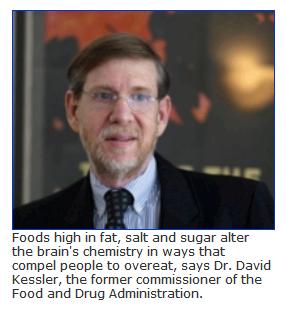WASHINGTON - He went in the middle of the
night, long after the last employee had locked up the Chili's Grill and
Bar. He'd steer his car around the back, check to make sure no one was
around and then quietly approach the Dumpster.
 If
anyone noticed the man foraging through the trash, they would have
assumed he was a vagrant. Except he was wearing black dress slacks and
padded gardening gloves.
If
anyone noticed the man foraging through the trash, they would have
assumed he was a vagrant. Except he was wearing black dress slacks and
padded gardening gloves.
The high-octane career path of David Kessler, the Harvard-trained doctor, lawyer, medical school dean and former commissioner of the Food and Drug Administration, had come to this: nocturnal Dumpster diving. It took many of these forays until Kessler emerged with his prize: ingredient labels affixed to empty cardboard boxes that spelled out the fats, salt and sugar used to make the Southwestern Eggrolls, Boneless Shanghai Wings and other dishes served by the nation's second-largest restaurant chain.
Kessler was on a mission to understand a problem that has vexed him since childhood: why he can't resist certain foods.
His resulting theory, described in his new book, "The End of Overeating," is startling. Foods high in fat, salt and sugar alter the brain's chemistry in ways that compel people to overeat. "Much of the scientific research around overeating has been physiology - what's going on in our body," he said. "The real question is what's going on in our brain."
The ingredient labels gave Kessler information the restaurant chain declined to provide when he asked for it. At the FDA, Kessler pushed through nutrition labels on foods sold through retail outlets but stopped short of requiring the same for restaurants. Yet if suppliers ship across state lines, as suppliers for Chili's do, the ingredients must be printed on the box. That is what led Kessler, one of the nation's leading public health figures, to hang around trash bins across California.
The labels showed the foods were bathed in salt, fat and sugars, beyond what a diner might expect by reading the menu, Kessler said. The ingredient list for Southwestern Eggrolls mentioned salt eight different times; sugars showed up five times. The "egg rolls," which are deep-fried in fat, contain chicken that has been chopped up like meatloaf to give it a "melt in the mouth" quality that also makes it easier to eat quickly. By the time a diner has finished this appetizer, the person has consumed 910 calories, 57 grams of fat and 1,960 milligrams of sodium.
Instead of satisfying hunger, the salt-fat-sugar combination will stimulate that diner's brain to crave more, Kessler said. And the food industry manipulates this neurological response, designing foods to induce people to eat more than they should or even want to, Kessler found.
His theory, borne out in a growing body of scientific research, has implications not just for the increasing number of Americans struggling with obesity but for health providers and policymakers.
"The challenge is how do we explain to America what's going on - how do we break through and help people understand how their brains have been captured?" he said.
Kessler is best remembered for his investigation of the tobacco industry and attempts to place it under federal regulation while he was FDA commissioner from 1990 to 1997.
Kessler's aggressive approach toward the tobacco industry led to billion-dollar settlements between Big Tobacco and 46 states and laid the groundwork for legislation now pending in Congress that would place tobacco under FDA regulation.
Whether government ought to exercise tougher controls over the food industry is going to be the next great debate, especially since much of the advertising is aimed at children, Kessler said.
"The food the industry is selling is much more powerful than we realized," he said. "I used to think I ate to feel full. Now I know, we have the science that shows, we're eating to stimulate ourselves. And so the question is what are we going to do about it?"
Through interviews with scientists, psychologists and food industry insiders, and his own scientific studies and hours spent surreptitiously watching other diners at food courts and restaurants around the country, Kessler said, he finally began to understand why he couldn't control his eating.
"Highly palatable" foods - those containing fat, sugar and salt - stimulate the brain to release dopamine, the neurotransmitter associated with the pleasure center, he found. In time, the brain gets wired so that dopamine pathways light up at the mere suggestion of the food, such as driving past a fast-food restaurant, and the urge to eat the food grows insistent. Once the food is eaten, the brain releases opioids, which bring emotional relief. Together, dopamine and opioids create a pathway that can activate every time a person is reminded about the particular food. This happens regardless of whether the person is hungry.
Not everyone is vulnerable to "conditioned overeating" - Kessler estimates that about 15 percent of the population is not affected and says more research is needed to understand what makes them immune.
But the key to stopping the cycle is to rewire the brain's response to food, he said.
Deprivation only heightens the way the brain values the food, which is why dieting doesn't work, he said.
 If
anyone noticed the man foraging through the trash, they would have
assumed he was a vagrant. Except he was wearing black dress slacks and
padded gardening gloves.
If
anyone noticed the man foraging through the trash, they would have
assumed he was a vagrant. Except he was wearing black dress slacks and
padded gardening gloves.The high-octane career path of David Kessler, the Harvard-trained doctor, lawyer, medical school dean and former commissioner of the Food and Drug Administration, had come to this: nocturnal Dumpster diving. It took many of these forays until Kessler emerged with his prize: ingredient labels affixed to empty cardboard boxes that spelled out the fats, salt and sugar used to make the Southwestern Eggrolls, Boneless Shanghai Wings and other dishes served by the nation's second-largest restaurant chain.
Kessler was on a mission to understand a problem that has vexed him since childhood: why he can't resist certain foods.
His resulting theory, described in his new book, "The End of Overeating," is startling. Foods high in fat, salt and sugar alter the brain's chemistry in ways that compel people to overeat. "Much of the scientific research around overeating has been physiology - what's going on in our body," he said. "The real question is what's going on in our brain."
The ingredient labels gave Kessler information the restaurant chain declined to provide when he asked for it. At the FDA, Kessler pushed through nutrition labels on foods sold through retail outlets but stopped short of requiring the same for restaurants. Yet if suppliers ship across state lines, as suppliers for Chili's do, the ingredients must be printed on the box. That is what led Kessler, one of the nation's leading public health figures, to hang around trash bins across California.
The labels showed the foods were bathed in salt, fat and sugars, beyond what a diner might expect by reading the menu, Kessler said. The ingredient list for Southwestern Eggrolls mentioned salt eight different times; sugars showed up five times. The "egg rolls," which are deep-fried in fat, contain chicken that has been chopped up like meatloaf to give it a "melt in the mouth" quality that also makes it easier to eat quickly. By the time a diner has finished this appetizer, the person has consumed 910 calories, 57 grams of fat and 1,960 milligrams of sodium.
Instead of satisfying hunger, the salt-fat-sugar combination will stimulate that diner's brain to crave more, Kessler said. And the food industry manipulates this neurological response, designing foods to induce people to eat more than they should or even want to, Kessler found.
His theory, borne out in a growing body of scientific research, has implications not just for the increasing number of Americans struggling with obesity but for health providers and policymakers.
"The challenge is how do we explain to America what's going on - how do we break through and help people understand how their brains have been captured?" he said.
Kessler is best remembered for his investigation of the tobacco industry and attempts to place it under federal regulation while he was FDA commissioner from 1990 to 1997.
Kessler's aggressive approach toward the tobacco industry led to billion-dollar settlements between Big Tobacco and 46 states and laid the groundwork for legislation now pending in Congress that would place tobacco under FDA regulation.
Whether government ought to exercise tougher controls over the food industry is going to be the next great debate, especially since much of the advertising is aimed at children, Kessler said.
"The food the industry is selling is much more powerful than we realized," he said. "I used to think I ate to feel full. Now I know, we have the science that shows, we're eating to stimulate ourselves. And so the question is what are we going to do about it?"
Through interviews with scientists, psychologists and food industry insiders, and his own scientific studies and hours spent surreptitiously watching other diners at food courts and restaurants around the country, Kessler said, he finally began to understand why he couldn't control his eating.
"Highly palatable" foods - those containing fat, sugar and salt - stimulate the brain to release dopamine, the neurotransmitter associated with the pleasure center, he found. In time, the brain gets wired so that dopamine pathways light up at the mere suggestion of the food, such as driving past a fast-food restaurant, and the urge to eat the food grows insistent. Once the food is eaten, the brain releases opioids, which bring emotional relief. Together, dopamine and opioids create a pathway that can activate every time a person is reminded about the particular food. This happens regardless of whether the person is hungry.
Not everyone is vulnerable to "conditioned overeating" - Kessler estimates that about 15 percent of the population is not affected and says more research is needed to understand what makes them immune.
But the key to stopping the cycle is to rewire the brain's response to food, he said.
Deprivation only heightens the way the brain values the food, which is why dieting doesn't work, he said.

